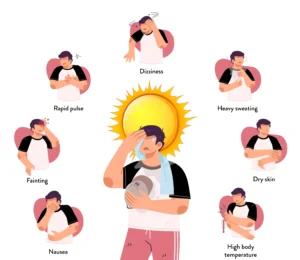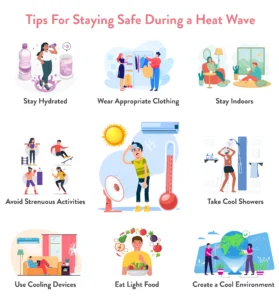Are you prepared to face the scorching heat wave this season? With temperatures rising to extreme levels, saving oneself from a heatwave has become of utmost importance.
Typically, India is known for its diverse climate and often experiences extreme weather conditions, including fiery heat waves. According to the India Meteorological Department (IMD) this summer season, particularly in the northern regions like Delhi NCR, Punjab, Rajasthan and other North Indian states, can be brutal, with temperatures soaring well above 45 degrees Celsius. Therefore, staying safe during these intense conditions is critical to avoiding heat-related illnesses and ensuring general well-being.
This article comprises some essential tips and strategies to help you stay safe during a heat wave. But first, let’s understand why heat waves are dangerous.
Why are Heat Waves Dangerous?
What is Heat wave? It is a prolonged period of excessively hot weather, often accompanied by high humidity. These conditions can be life-threatening, especially for vulnerable individuals. The dangers of heat waves include heat exhaustion, increased mortality, heatstroke, dehydration, and respiratory issues.
Some of the common symptoms of these conditions are:

- Heavy sweating
- Weakness
- Dizziness
- Nausea
- Fainting
- High body temperature
- Altered mental state (confusion, agitation, slurred speech)
- Rapid pulse
- Dry skin
How to Prepare for a Heat Wave in India?
During heat wave temperatures, preparation becomes the key to staying safe. Here are some steps to take before the temperatures rise:
- Keep an eye on weather forecasts and stay informed about heat alerts issued by the Indian Meteorological Department (IMD).
- Ensure you carry a water bottle and stock up a little before leaving your home also carry an umbrella, if necessary.
- Use shades, curtains, and reflective materials to keep your home cool. Consider investing in air conditioners or coolers.
- If you are planning for outdoor activities go for cooler parts of the day, such as early morning or late evening.
- Check on Vulnerable Individuals like kids and elderly people with chronic illnesses and make sure they have access to cool environments.
Tips for Staying Safe During a Heat Wave

To stay safe during these heat waves these few guidelines can help you:
- Stay Hydrated: Drink plenty of water throughout the day, even if you don’t feel thirsty. Avoid alcohol and caffeine, as they can dehydrate you.
- Wear Appropriate Clothing: Opt for lightweight, loose-fitting, and light-coloured clothes. Hats and sunglasses can protect you from direct sunlight.
- Stay Indoors: Remain inside during the hottest parts of the day (10 AM to 4 PM). If you must go outside, seek shade and take frequent breaks.
- Use Cooling Devices: Use fans, air conditioners, or coolers to normalise and maintain a comfortable indoor temperature.
- Eat Light Food: Consume light, easy-to-digest meals. Avoid heavy, hot, and fried foods.
- Avoid Strenuous Activities: Postpone intense physical activities during the noon hours. You can plan these activities in the early morning or late evening.
- Take Cool Showers: Regularly take cool showers or baths to lower your body temperature.
- Create a Cool Environment: Use wet towels, cold packs, or even a damp cloth to cool down. You can also keep a small spray bottle in your bag filled with water for a quick face misting.
Heat Wave Temperature in India
Some places are red alert for heat waves. To give you an idea of the temperatures you might face, here is a table showing average heat wave temperatures in some regions of India:
| Region |
Average Temperature (°C) |
| Heat Wave Temperature in Delhi NCR |
40-45 |
| Heat Wave Temperature in Punjab |
38-44 |
| Heat Wave Temperature in Haryana |
40-46 |
| Heat Wave Temperature in Uttar Pradesh |
38-45 |
| Heat Wave Temperature in Rajasthan |
42-48 |
Special Considerations During Heat Wave for Vulnerable Groups
Certain age groups are more vulnerable to the effects of extreme heat and such high temperatures. While keeping in mind that some areas are on red alert because of heat waves, it’s important to consider these groups:
- Elderly Individuals: People above 60 years are more prone to heat-related problems. To help them by checking on them regularly and ensuring they stay hydrated and in cool environments.
- Infants and Young Children: Babies and younger kids are not capable of adjusting to such extreme temperatures. Therefore, keeping them out of the sun becomes really important. Ensure they drink enough fluids, and dress them in Light colours and loose clothing.
- People with Chronic Illnesses: Those with heart disease, diabetes, or respiratory conditions need to take extra precautions during heat waves. Ensure they have proper medication supplies and follow their doctor’s advice to stay safe.
- Outdoor Workers: Working outdoors in high heatwave temperatures can be challenging because of exhaustion and constant sweating. You can ensure they stay in shaded areas, take frequent breaks, and have plenty of water.
Emergency Measures During Heat Wave Red Alert
Planning ahead can make all the difference. Below are a few tips that can help you in case of a heat-related emergency:
- Call for Help: According to the National Centre for Disease Control (NCDC), you can dial 102/108 for emergency services immediately if someone shows signs of heatstroke.
- Cool the Person: Following emergency techniques such as cool water immersive cooling, moving them to a shaded or air-conditioned place, applying cool water to their skin, and using ice packs on their neck, armpits, and groin can help people affected by heat strokes.
- Hydrate: If the person is not unconscious, you can give them small sips of cool water to help in adjusting the body temperature.
Dos & Don’ts in Soaring Heat Wave Temperatures
Staying cool is essential to prevent heat-related illnesses. Here are some dos and don’ts to follow along with effective cooling techniques to prevent yourself from heat:
Do’s
- Use Fans and Air Conditioners to ensure that you are in a well-ventilated and cooled place
- Whenever you are going for outdoor activities, seek shade and avoid direct sunlight.
- Seek immediate medical help if you feel dizzy, high fever, exhaustion, or rapid breathing.
- Ensure you wear loose clothing to prevent heat rashes and overheating.
- Keep your child well-hydrated. Infants under 6 months should be exclusively breastfed, and breastfeeding mothers should drink plenty of water. Children 6 months and older should drink water regularly throughout the day
Don’ts
- Do not give infants medication for overheating without consulting a doctor.
- Do not leave elderly people, infants and children in closed, unventilated spaces like cars or rooms with closed windows. They quickly become overheated and are unsafe.
- Do not let your children play outside for long periods in the heat without supervision. Ensure they rest every 30 minutes to avoid dehydration and heat-related issues.
Conclusion
Heat waves can be harmful, but with careful planning and safeguards, you can stay safe and healthy. Keep yourself informed about weather conditions, stay hydrated, avoid intense activity during peak heat hours, and protect vulnerable individuals like elders and infants. If you suspect someone is suffering from heatstroke, relocate them to a cooler location, administer cool water to their skin, and contact emergency medical services. All these suggestions mentioned in the article can help you navigate the severe heat wave of Indian summers while protecting yourself and your loved ones from heat-related ailments. Remember that staying cool is more than just about comfort; after facing the heat wave red alert it’s about survival. Stay safe!
FAQs about Heat Waves
What should I do if I do not have air conditioning?
Use fans, stay in well-ventilated spaces, keep a wet cloth with you, and a small spray bottle for face misting in order to balance the body temperature.
How much water should I drink during a heatwave?
You should aim for at least 8-10 glasses a day and more if you’re sweating heavily.
Can heat waves affect pets?
Yes, make sure they have plenty of drink and shade, and avoid walking them at high temperatures.
What are the signs of heat stroke, and how should I respond?
The common signs of heatstroke include high body temperature, confusion, rapid pulse, and unconsciousness. Seek immediate medical help and cool the person with ice packs or a cold bath.
Sources –
https://ncdc.mohfw.gov.in/wp-content/uploads/2024/03/Emergency-Cooling-for-Severe-Heat-Related-Illnesses_March2024_NPCCHH.pdf
https://m.economictimes.com/news/india/delhi-weather-forecast-imd-issues-heatwave-red-alert-in-north-india/amp_videoshow/111086046.cms
https://www.businesstoday.in/latest/trends/story/imd-predicts-heatwave-in-northwest-india-from-may-16-heavy-rainfall-in-these-regions-429378-2024-05-13
https://economictimes.indiatimes.com/news/india/delhi-heat-index-crosses-50-as-imd-issues-red-alert-when-heatwave-in-north-india-will-ease/articleshow/111072409.cms?from=mdr
